The healthy holistic
The Ultimate Destination For Holistic, Whole-Life Wellness — Nutrition, Movement, Mental Health, and Clean Living for Every Body.

Healthy Recipes & Nutrition Tips
Access a collection of delicious and nutritious recipes to fuel your body and delight your taste buds. Explore expert advice, tips, and recipes to nourish your body and enhance your well-being.

holistic health & wellness
Dive into holistic approaches to wellness, integrating mind, body, and spirit for comprehensive health and vitality. Learn about alternative and complementary healing modalities, such as aromatherapy.

mental health & positive mindset
Discover resources and strategies to support your mental health journey, foster resilience, and cultivate inner peace. Learn techniques to cultivate a positive mindset, overcome limiting beliefs and more.
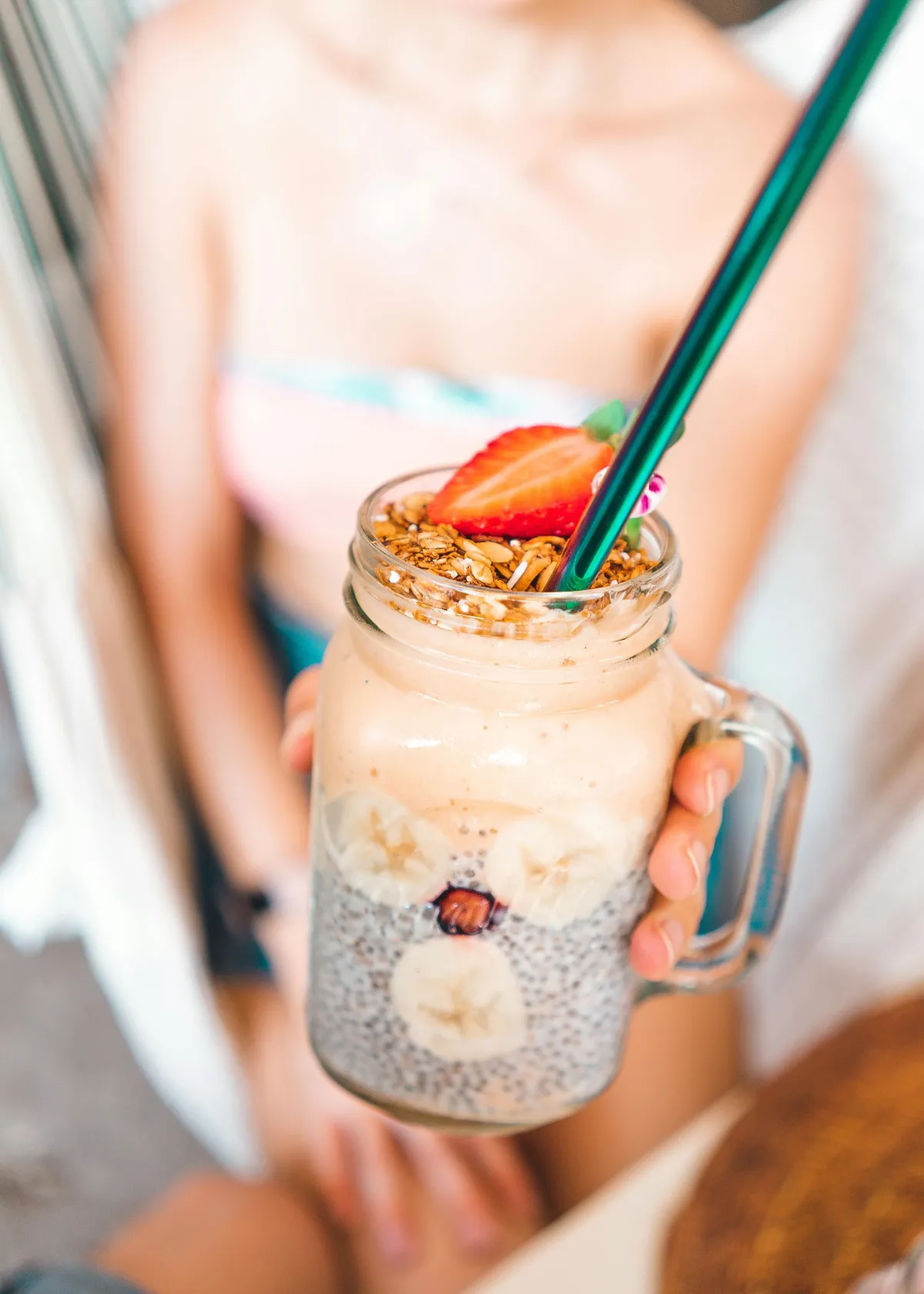
Authentic Tzatziki Sauce
This creamy and tangy homemade Tzatziki Sauce is made with full-fat Greek yogurt, fresh cucumber, garlic, and dill for an authentic Mediterranean flavor. Perfect as a dip, sauce, or spread, it pairs b... ...more
Healthy Recipes
March 24, 2025•1 min read
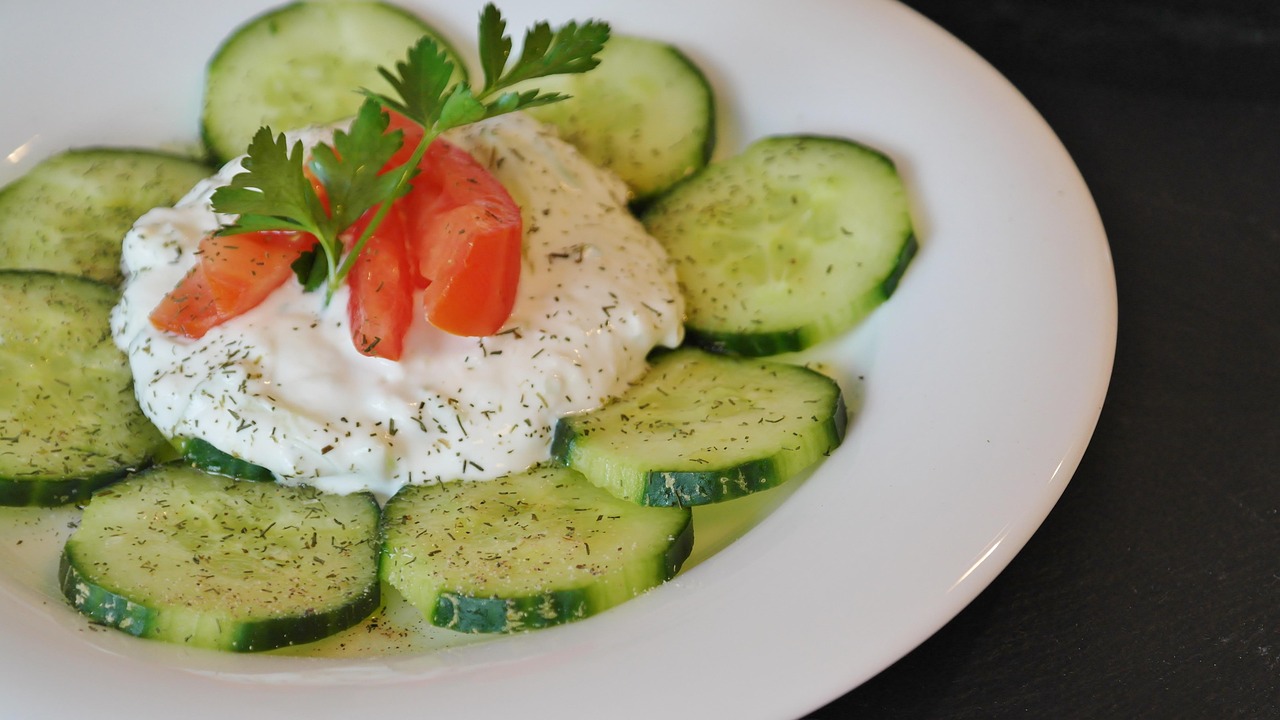
Caramelized Onion & Spinach Scramble with Avocado, Turkey Sausage & Fresh Fruit
This protein-packed breakfast combines fluffy scrambled eggs with sautéed spinach, bell pepper, and caramelized red onion, served with all-natural turkey sausage, creamy avocado, and fresh fruit for a... ...more
Healthy Recipes
March 24, 2025•1 min read
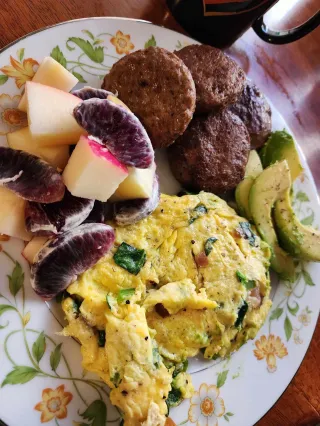
Peanut Butter Fro-Yo Bites with Gently Dried Strawberries
These creamy and delicious Peanut Butter Fro-Yo Bites are the perfect bite-sized frozen treat! Made with vanilla yogurt, natural peanut butter, and gently dried strawberries, they’re a protein-packed,... ...more
Healthy Recipes
March 24, 2025•1 min read

Easy Greek Salad
This classic Greek salad is a refreshing and flavorful combination of crisp vegetables, tangy feta cheese, and a zesty olive oil dressing infused with oregano. Perfect as a light meal or a side dish, ... ...more
Healthy Recipes
March 24, 2025•1 min read

PB&J Smoothie with Almond Milk
This PB&J-inspired smoothie blends the sweet flavors of berries, creamy peanut butter, and almond milk for a nostalgic yet nutrient-packed drink. With added chia seeds, spinach, and raw honey, it’s a ... ...more
Healthy Recipes
March 24, 2025•1 min read
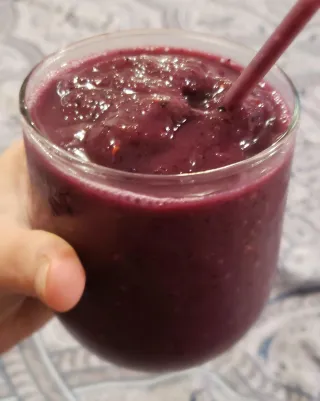
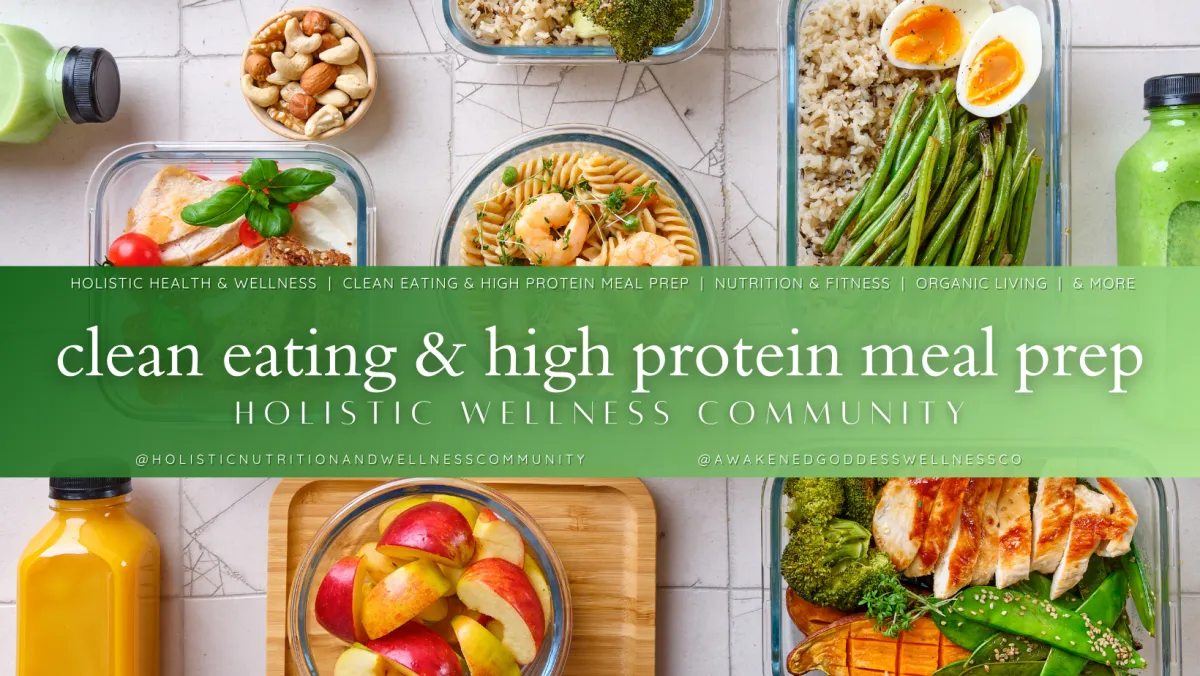
Join Our FREE Facebook Group
Holistic Wellness Community | Clean Eating & High-Protein Meal Prep
Join our Holistic Wellness Community to connect, learn, and thrive alongside like-minded individuals who are passionate about clean eating and high-protein meal prep. In this supportive space, you'll find valuable resources to enhance your health, discover nourishing recipes, and share your journey toward holistic wellness. Together, we’ll empower each other to live healthier, more balanced lives.

What Is Holistic Health And Wellness?
Holistic health and wellness is an integrated approach to health that looks at the person as a whole — body, mind, and spirit. It focuses on achieving balance and harmony in all areas of life, incorporating healthy nutrition, regular movement, emotional support, and spiritual practices. The goal is to promote overall wellbeing, prevent illness, and empower individuals to live their best lives.

What Does A Holistic Approach Focus On?
A holistic approach focuses on treating the root causes of issues, not just masking symptoms. It emphasizes balance across all aspects of life, including physical health, mental clarity, emotional wellbeing, and spiritual growth.
How Does Holistic Health Differ From Conventional Health And Medicine?
Holistic health takes into account emotional, spiritual, and mental health alongside physical health. Traditional models often focus more on treating physical symptoms, while holistic health seeks to address all aspects of a person’s wellbeing.
Unlike conventional medicine, which often focuses on symptom management, holistic health seeks to address underlying imbalances and promote long - term healing through natural means, lifestyle changes, and emotional support.
What Is A Holistic Lifestyle?
A holistic lifestyle involves making choices that prioritize balance, wellbeing, and self-care in all aspects of life. It includes nurturing your physical health through proper nutrition, exercise, and rest, while also caring for your mental, emotional, and spiritual health. This lifestyle promotes mindfulness, natural remedies, and being in tune with your body's needs.
What Are Key Elements Of A Holistic Lifestyle?
A holistic lifestyle includes a healthy diet, physical activity, stress management, mindfulness practices, emotional expression, and spiritual connection. It also includes a supportive social environment and regular self-care routines.
How Does A Holistic Lifestyle Support Overall Well-Being?
It creates a foundation of balance and harmony, addressing all areas of life. By integrating self-care practices into your daily routine, you cultivate a healthier, more fulfilling lifestyle that reduces stress and promotes healing.
What Is Holistic Nutrition?
Holistic nutrition is an approach to eating that considers the whole body and its needs, focusing on nutrient-dense, whole foods. It looks at the body’s individual requirements, such as nutrient deficiencies or sensitivities, and uses food to support physical, mental, and emotional health. The goal is to nourish the body in a way that promotes optimal health and healing.
How Is Holistic Nutrition Different From Conventional Dieting?
While conventional dieting often focuses on weight loss, holistic nutrition prioritizes nourishing the body with whole, natural foods to support overall health. It emphasizes individual needs, like food sensitivities or deficiencies, rather than following one-size-fits-all rules.
How Does Food Affect Mental Health In Holistic Nutrition?
Holistic nutrition recognizes the connection between food and mental health. Nutrient-rich foods can help to improve mood, support cognitive function, and help manage stress - while processed foods may contribute to anxiety or depression.
What is Non-Toxic Living / Organic Lifestyle?
Non-toxic living means choosing products and practices that avoid harmful chemicals and synthetic substances. This lifestyle focuses on reducing exposure to toxins in everyday life, from food and cleaning products to personal care items. An organic lifestyle is one that prioritizes organic, chemical-free food, clothing, and home products to support overall health and sustainability.
What Are Some Examples Of Non-Toxic Living?
Using natural cleaning products, eating organic food, choosing chemical-free personal care items, and minimizing the use of plastics are all examples of non-toxic living. It’s about reducing your exposure to harmful chemicals that can disrupt your health.
What Is Mental Wellness?
Mental wellness refers to maintaining a state of mental health that is balanced, positive, and resilient. It involves managing stress, cultivating emotional intelligence, and practicing self-care to promote mental clarity, happiness, and personal growth. Mental wellness is integral to overall health and wellbeing.
What Factors Contribute To Mental Wellness?
Mental wellness is supported by regular self-care, healthy relationships, proper sleep and nutrition, stress management, and emotional regulation. It also involves developing coping strategies for life's challenges, healing past wounds, and learning to maintain a positive mindset.
What is Mindful Movement?
Mindful movement refers to physical activities that are performed with full attention and awareness of the body’s sensations, breath, and movements. It’s not just about exercise but also about connecting with your body in a nurturing way, improving flexibility, strength, and mental clarity. Practices like yoga, tai chi, and Pilates are common forms of mindful movement.
How Is Mindful Movement Different From Regular Exercise?
While regular exercise can focus on physical results, mindful movement is about being present with your body and using movement to support mental and emotional health. It emphasizes slowing down, tuning into the body, and releasing stress.
What Benefits Does Mindful Movement Offer?
Mindful movement can reduce stress, improve mental clarity, and promote relaxation. It also enhances flexibility and physical health while cultivating a deeper connection with your body’s needs and limits.
How Can Holistic Health Practices Benefit Me?
Holistic health practices can help prevent chronic illness, manage stress, improve emotional wellbeing, and foster long-term vitality. It provides tools for self-care and personal empowerment in maintaining health.
How Can A Holistic Lifestyle Help Me Heal?
A holistic lifestyle promotes healing by addressing all aspects of your life, not just the physical. It supports emotional health through self-care practices, mindfulness, and emotional regulation. A holistic lifestyle also encourages a balanced diet, regular physical activity, and nurturing relationships, all of which contribute to overall wellbeing and healing.
What Healing Benefits Can I Expect From A Holistic Lifestyle?
You may experience improved mental clarity, reduced stress, better physical health, and a deeper sense of emotional resilience. By nurturing your body, mind, and spirit, healing becomes a more natural, integrated process.
Can A Holistic Lifestyle Speed Up Recovery From Trauma?
Yes, a holistic approach can support faster recovery by addressing the root causes of stress and trauma and providing tools for emotional regulation and self-care. It encourages deep healing on a mental, emotional, and physical level.
Will A Holistic Lifestyle Improve My Mental Health?
A holistic lifestyle can significantly improve mental health by promoting emotional balance, reducing stress, and supporting resilience. Practices like mindfulness, meditation, and exercise can reduce anxiety, depression, and stress, while a healthy diet nourishes the brain. It also helps you develop healthy coping mechanisms and emotional intelligence.
How Does A Holistic Lifestyle Help With Anxiety And Depression?
Through practices like mindful movement, therapy, balanced nutrition, and meditation, a holistic lifestyle can help regulate emotions and reduce the intensity of anxiety and depression. It focuses on holistic care to help you manage and heal from these mental health challenges.
Do Meditation And Breathwork Actually Work?
Meditation and breathwork are powerful tools for calming the nervous system, improving focus, and reducing stress. Studies have shown that these practices can lower cortisol levels, promote relaxation, and enhance mental clarity. By incorporating them into your daily routine, you can create a sense of inner peace and balance.
How Do Meditation And Breathwork Help With Stress?
Meditation and breathwork activate the parasympathetic nervous system, which calms the body and reduces the fight-or-flight response. This helps manage stress, lowers blood pressure, and promotes emotional resilience.
Can Meditation And Breathwork Help With Trauma Recovery?
Yes, these practices help by creating a safe space for emotional processing, calming the nervous system, and helping individuals reconnect with their bodies. Over time, they support trauma recovery by providing emotional regulation and grounding techniques.
What Is Self-Care And Why Is It Important?
Self-care is the practice of taking intentional actions to nourish your body, mind, and spirit, promoting overall well-being. It can range from simple activities like taking a relaxing bath to deeper practices such as setting healthy boundaries or engaging in therapy. Self-care is crucial because it helps prevent burnout, reduces stress, and improves mental health.
How Can Self-Care Improve My Mental Health?
Regular self-care helps you manage stress, reduce anxiety, and create emotional balance. By prioritizing your own needs, you foster a sense of worth and respect for yourself, which improves overall emotional well-being.
How Does Emotional Healing Work In Holistic Practices?
Emotional healing in holistic practices involves addressing the emotional pain and trauma that may be contributing to mental and physical health issues. It often includes techniques like therapy, emotional release, meditation, and energy healing to process and heal unresolved emotions. The goal is to release emotional blockages, cultivate self-love, and restore balance within.
Can Emotional Healing Impact My Physical Health?
Yes, emotional healing can lead to reduced physical symptoms of stress, such as tension, headaches, or digestive issues. The mind-body connection means emotional health is directly tied to physical well-being.
How Does Trauma Affect The Body?
Trauma can deeply affect the body by disrupting its physical and emotional balance. Chronic trauma can manifest in the form of physical symptoms like tension, pain, digestive issues, or fatigue. Additionally, trauma can alter brain chemistry and nervous system regulation, leading to anxiety, depression, and even chronic health conditions.
What Is The Role Of Sleep In Holistic Wellness?
Sleep is essential for overall wellness, as it allows the body and mind to rest, recover, and recharge. A holistic approach to sleep focuses on creating a restful environment, following healthy sleep habits, and addressing underlying issues like stress or anxiety that can disrupt sleep. Quality sleep supports immune function, mental clarity, emotional regulation, and physical health.
How Does Poor Sleep Affect Mental Health?
Poor sleep can lead to irritability, mood swings, increased stress, and difficulty concentrating. Chronic sleep issues can also exacerbate anxiety and depression, creating a negative cycle that impacts overall wellness.
What Is The Connection Between Creativity And Healing?
Creativity, or Creative Expression, is a powerful tool for healing, as it allows individuals to express emotions, process trauma, and connect with their inner selves in a healthy and constructive way. Artistic practices like writing, painting, and music can provide an outlet for difficult emotions and help bring clarity to complex feelings. Creativity can promote relaxation, reduce stress, and improve mental clarity.
How Does Creative Expression Support Emotional Healing?
Creative expression helps individuals release emotions that may be difficult to verbalize, offering a therapeutic way to process feelings. It also allows for self-discovery, building confidence and promoting personal growth.
Journaling, painting, dancing, or engaging in any form of art can be a great way to channel emotions. These activities can be soothing, empowering, and deeply transformative.






